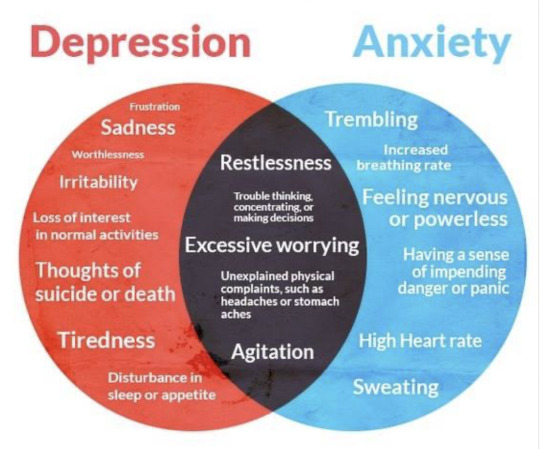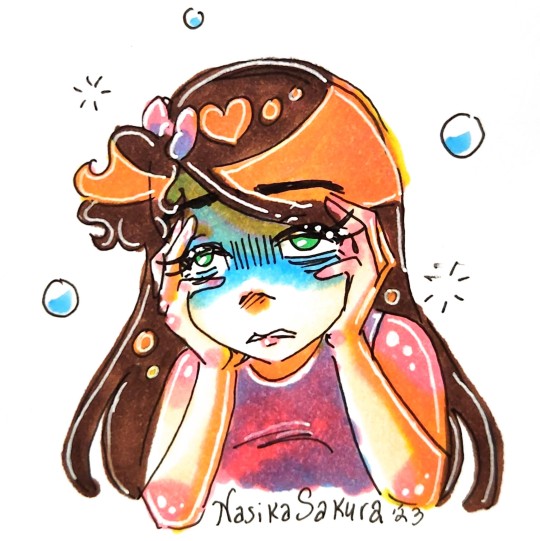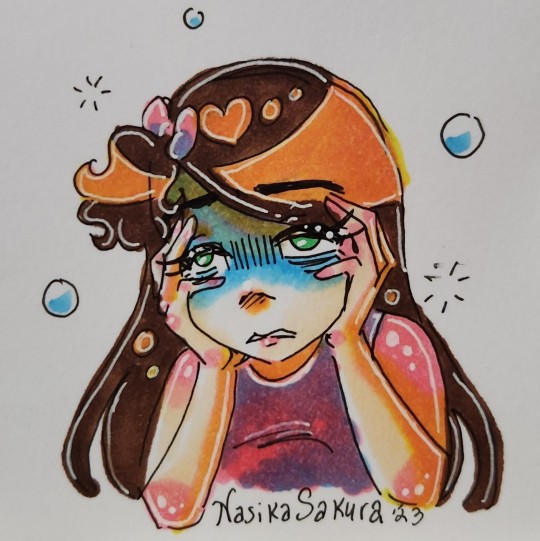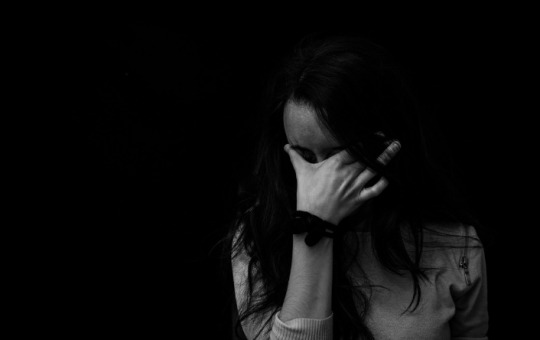#Anxiety symptoms
Photo

39 notes
·
View notes
Text
Is it just me or does everyone with high social anxiety stop hearing properly in scary settings and hence have to lipread or ask them to repeat their words again
#anxitey#anxiety support#anxiety#anxiety sucks#anxiety girls win#anxiety through the roof#anxiety things#social anxiety#socially anxious#depressing life#anxiety stuff#anxiety sans#anxiety spiral#anxiety symptoms#anxiety struggles#cryinginmyroom#crying in my room again
8 notes
·
View notes
Text
Am I the only person who wants to cut off her arms when Anxious? I get anxiety, suddenly i feel my arms as two heavy things that are uncomfortable, occupying space and I feel the need to get rid of them?
My hands also start hurting.
3 notes
·
View notes
Text
Guys anxiety sucks not because of the lack of peace of mind but also because of all these psychosomatic symptoms that include:
stomach upsets
migraines & headaches
feeling cold for no reason especially in hands and feet
Dizziness/lightheadedness
feeling electricity go down your spine
And i really could go on forever but being told to "calm down" really isn't gonna work magically by itself when the symptoms get a tad too physical. So please just don't immediately say "calm down" to someone because even if the mind quietens for a moment the body is still keeping the anxiety trapped inside.
No purpose for this random vent I suppose I just felt the need to scream those words into the void.
#diary entry#random thoughts#spilled thoughts#trying my best#trying to feel better#anxiety attack#anxiety symptoms#pls note these symptoms might not be everyone's experience & since other medical causes have been ruled out anxiety is actually the reason#on that note#migraines can be triggered by anxiety as well so that's a nice vicious cycle you got right there
7 notes
·
View notes
Text
Begging god to tell me why he made me this way because they always ask me why do you do it?
They never ask if I'm okay. They never ask if I need someone to talk to. They never ask if I need a hug. they never tell me it'll be okay. They never tell me to call them the next time I think about it. They never tell me to text them either. Its always "why do I do it?"
#tw depression#reality#if reality was like#depression#anxiety#anxiety symptoms#rant#rant post#vent#tw vent#tw suicide#tw death#tw trauma#traumacore#trauma#ventcore
4 notes
·
View notes
Text



Nausea.
Ugh...
#anime art#ink drawing#copic art#ink illustration#original character#self portrait#nauseous#nausea#anxiety#anxiety art#anxiety awareness#anxiety symptoms#mental health art#mental health#mental health awareness#vent art#daily doodle#art challenge#NasikaSakura_Nasika
8 notes
·
View notes
Text
My anxiety has been SO awful lately. God.
#pms anxiety is SO terrible#pms symptoms#anxiety symptoms#I have been feeling really bad for like 48 hours
4 notes
·
View notes
Video
youtube
Okay, the hot topic, something we all have, something we all feel from time to time, or maybe all of the time... it's anxiety! The truth is anxiety can effect so many parts of our life from our stomach to our relationships to our work to our eyes to our brain and so many other things. So if you ask yourself is anxiety affecting my work or is anxiety affecting my relationships, then let's dive into the 8 things anxiety makes you do (that you may not know). These are not the only things anxiety makes you do or anxiety affects, there could be many things that anxiety could affect depending on your individual background, brain, body and relationships. But these are common things that anxiety makes you do. Do you have anxiety?
Let's look at the signs and symptoms of anxiety: https://www.youtube.com/watch?v=XrEwsxYt25w
5 signs of social anxiety: https://www.youtube.com/watch?v=OC8KRPYAdBk
5 misconceptions of anxiety: https://www.youtube.com/watch?v=DCSESj_sWnw
#social anxiety#anxiety attack#anxiety disorders#anxiety#mental health#mental disorder#mental illness#psychology#kati morton#katimorton#anxiety symptoms
6 notes
·
View notes
Text
And then you get back to your room, your whole body aches from the anxiety, you already threw up a couple times earlier today, the acid growls in your guts, the piercing headache of how painfully heavy the day was, your whole body weights in the bed, it’s like you’re sinking in slowly, you mindlessly watch trash tv to stop thinking for a second, it’s empty inside, but in a way you don’t know how to fill it, in a way it seems very hard to fill…
#actuallybipolar#actually mentally ill#bipolar depression#anxious#anxienty#personal diary#tumblr diary#digital diary#home#anxiety symptoms#sadgirl#personal blog
5 notes
·
View notes
Text
so i found out the little bruises i get from stress are called "melancholy purple" (or purpura por melancolia in my first language) and i just think thats so pretty and poetic
1 note
·
View note
Text
Identifying early signs of mental health issues is crucial for timely intervention and effective treatment. Psychiatric care services in Jersey City, New Jersey offer essential support for individuals showing early symptoms of mental health conditions. These services provide a safe space for patients to discuss their concerns and receive professional guidance, ensuring that any emerging issues are addressed promptly and effectively.
0 notes
Text
Anxiety Unveiled: Recognizing and Understanding Common Symptoms

Anxiety is a prevalent mental health condition that affects millions of individuals worldwide. While occasional feelings of anxiety are a normal part of life, persistent and overwhelming anxiety can significantly impact daily functioning and overall well-being. Recognizing and understanding the common symptoms of anxiety is crucial for early intervention and effective management.
Understanding Anxiety Symptoms
Anxiety symptoms encompass a wide range of physical, emotional, and cognitive manifestations. These symptoms can vary in severity and duration, but they often interfere with various aspects of an individual's life, including work, relationships, and personal fulfillment.
Physical Symptoms
Physical symptoms of anxiety can manifest in numerous ways, often mimicking the body's natural response to danger or stress. Common physical symptoms include:
Rapid Heartbeat: An accelerated heart rate is a hallmark symptom of anxiety as the body prepares for a fight-or-flight response.
Muscle Tension: Persistent muscle tension, particularly in the neck, shoulders, and jaw, is a common manifestation of anxiety.
Shortness of Breath: Shallow or rapid breathing may occur during periods of heightened anxiety, leading to feelings of breathlessness or suffocation.
Gastrointestinal Distress: Anxiety can disrupt normal digestive processes, leading to symptoms such as stomachaches, nausea, or diarrhea.
Sweating and Trembling: Excessive sweating and trembling are physical manifestations of the body's heightened arousal in response to perceived threats.
Emotional Symptoms
In addition to physical manifestations, anxiety often elicits a range of emotional responses that can be distressing and disruptive. Emotional symptoms may include:
Excessive Worry: Persistent and uncontrollable worry about future events, even when there is little or no imminent threat.
Irritability: Heightened irritability or agitation, often accompanied by difficulty concentrating or relaxing.
Feelings of Dread: Overwhelming apprehension or dread, often without a clear cause or trigger.
Panic Attacks: Intense episodes of fear or panic, characterized by rapid heartbeat, sweating, trembling, and a sense of impending doom.
Avoidance Behavior: The tendency to avoid situations or activities that provoke anxiety, leading to social isolation and impairment in daily functioning.
Cognitive Symptoms
Anxiety can also affect cognitive processes, leading to distorted thinking patterns and impaired decision-making. Mental symptoms may include:
Racing Thoughts: An influx of racing or intrusive thoughts makes concentrating or focusing on tasks challenging.
Catastrophic Thinking: Exaggerated fears or catastrophic predictions about potential outcomes, often leading to heightened anxiety.
Difficulty Problem-Solving: Impaired problem-solving abilities and difficulty making decisions, particularly in stressful situations.
Memory Problems: Forgetfulness or difficulty recalling information, which may be exacerbated during periods of high anxiety.
Hypervigilance: Heightened alertness or hypervigilance to potential threats, leading to constant apprehension.
Recognizing the Interplay of Symptoms
It's essential to recognize that anxiety symptoms often coexist and can exacerbate one another. For example, physical symptoms such as rapid heartbeat and shortness of breath may trigger feelings of panic or dread, further intensifying the emotional and cognitive aspects of anxiety. Similarly, mental symptoms such as racing thoughts or catastrophic thinking can contribute to increased muscle tension and gastrointestinal distress, creating a cycle of escalating symptoms.
Seeking Support and Treatment
If you recognize these symptoms in yourself or someone you care about, it's essential to seek support and treatment from qualified mental health professionals. Effective treatment for anxiety may include therapy, medication, lifestyle modifications, and self-care strategies.
Therapy: Cognitive-behavioral therapy (CBT) and other evidence-based therapeutic approaches can help individuals identify and challenge negative thought patterns, develop coping skills, and gradually confront feared situations.
Medication: In some cases, medication such as antidepressants or anti-anxiety medications may be prescribed to alleviate symptoms of anxiety. Working closely with a healthcare provider to determine the most appropriate drug and dosage is essential.
Lifestyle Modifications: Healthy lifestyle habits such as regular exercise, balanced nutrition, adequate sleep, and stress management techniques can help reduce anxiety symptoms and improve overall well-being.
Self-Care Strategies: Engaging in activities that promote relaxation and mindfulness, such as meditation, deep breathing exercises, and creative outlets, can relieve anxiety symptoms and enhance resilience.
Conclusion
Anxiety symptoms encompass a diverse array of physical, emotional, and cognitive manifestations that can significantly impact an individual's quality of life. By recognizing and understanding these common symptoms, individuals can take proactive steps to seek support and treatment, ultimately leading to improved mental health and well-being. If you or someone you know is struggling with anxiety, know that help is available, and recovery is possible with the proper support and resources.
0 notes
Text

Reflect within to recognize signs and symptoms of Anxiety Disorders. These may include excessive worrying, restlessness, fatigue, difficulty concentrating, and muscle tension. Understanding these indicators can prompt seeking appropriate support and treatment.
0 notes
Text
Prayer Calms Your Anxiety. Click to Watch☝🏽
#anxitey#overthinking#mental healing#mental health#anxiety relief#anxiety symptoms#spiritual healing#spiritual growth#pray to god#prayer is powerful#calm your mind#tiktok videos
0 notes
Text
Buspirone Medication for Anxiety Relief

Anxiety is a common mental health condition that affects millions of people worldwide. There are several types of anxiety disorders, but effective treatments, including medication, are available. Buspirone, often known as Buspar, is a regularly prescribed anxiolytic that helps to relieve anxiety symptoms.
Buspirone is in the azapirone class of medications and is frequently used in conjunction with selective serotonin reuptake inhibitors (SSRIs) or selective norepinephrine reuptake inhibitors. Buspirone, unlike benzodiazepines, has no sedative or muscle-relaxing properties, making it a safer option for anxiety reduction without the risk of addiction or withdrawal symptoms.
0 notes
Text
And if the scars don't stay on me forever than what was the point of all this suffering?
I just want to rip the skin off my body to free whatever's destroying my mind. I want it to bleed as I never learnt how to make others bleed. Oh tell me, what was the point to cry my eyes out?Why do I want to watch myself bleed everytime I am sad?
#tw depression#reality#if reality was like#depression#anxiety#anxiety symptoms#self harm#sh#tw sh#tw ventcore#tw vent#vent#ventcore#traumacore#trauma
2 notes
·
View notes